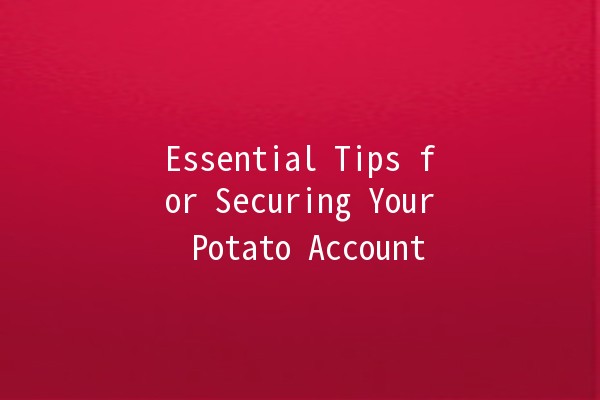In this digital age, securing your online accounts has become paramount. Your Potato account is no exception, and ensuring its security can safeguard your personal information and provide you with peace of mind. Here, we delve into practical tips to fortify your Potato account security, along with productivityenhancing strategies you can adopt.
Understanding the Importance of Account Security

Before we dive into actionable tips, it's crucial to understand the risks associated with weak account security. Cybercriminals employ various techniques to gain unauthorized access to accounts, leading to data theft, malicious activities, and even identity theft. Strengthening your Potato account security is your first line of defense against such threats.
Explanation
A strong password is one of the most critical components of your account security. It should be unique to your Potato account and not used for any other accounts.
Implementation
Length and Complexity: Aim for a password that is at least 12 characters long and includes a mix of uppercase and lowercase letters, numbers, and special characters.
Password Manager: Consider using a password manager to create and store complex passwords securely. This ensures you won't forget them and can generate unique passwords for each of your accounts.
Example: Instead of using "Potato123", create a password like "P0t@t0!S3cur3#456".
Explanation
Twofactor authentication adds an extra layer of security by requiring not only your password but also a second form of verification, such as a code sent to your mobile device.
Implementation
Setup 2FA: In your Potato account settings, look for the security options and enable 2FA.
Authentication Apps: Use authenticator apps like Google Authenticator or Authy for generating timelimited codes instead of relying solely on SMS.
Example: When logging in, after entering your password, you will receive a code on your device that you also need to input, significantly enhancing your account security.
Explanation
Changing your passwords regularly reduces the risk of longterm exposure from potential breaches.
Implementation
Set Reminders: Schedule reminders to update your passwords every three to six months.
Avoid Reusing Old Passwords: Each new password should be different and should not resemble previous ones.
Example: After changing your password, make sure not to revert to any previously used passwords or any variants.
Explanation
Regularly monitoring your account activity can help catch any unauthorized access early.
Implementation
Review Login History: Check your Potato account’s login history for any suspicious activity. Many platforms offer logs that display recent logins.
Enable Account Alerts: Set up alerts that notify you of any account changes or logins from new devices.
Example: If you see a login from an unfamiliar location or device, immediately change your password and investigate further.
Explanation
Phishing scams are a common method used by cybercriminals to gain access to accounts by tricking users into providing personal information.
Implementation
Recognize Suspicious Emails or Messages: Be wary of any communications that request personal information or ask you to click on links.
Verify URLs: Always check the URL of the website before entering your credentials. Legitimate sites will use HTTPS and have a proper domain.
Example: If you receive an email claiming to be from Potato asking for your login details, do not respond or click any links; instead, navigate directly to the Potato website.
Common Questions About Potato Account Security
If you suspect that your Potato account has been hacked, take immediate action. Change your password and enable twofactor authentication. Check your recent account activity for any unknown changes. If you notice anything suspicious, report it to Potato's support team without delay.
To recover your Potato account, go to the login page and click on the ‘Forgot Password?’ link. Follow the prompts to reset your password via the email associated with your account. Ensure that you create a strong and unique password once you regain access.
Twofactor authentication is crucial because it adds an additional layer of security beyond just your password. Even if someone manages to steal your password, they would also need the second factor (like a code sent to your phone) to access your account.
It's recommended to change your password every three to six months. Additionally, consider changing it immediately if you suspect that your account information may have been compromised.
Yes, using public WiFi can compromise your account security. Cybercriminals can intercept data transmitted over unsecured networks. Always use a Virtual Private Network (VPN) when accessing sensitive accounts on public WiFi.
If you receive an email that seems suspicious or asks for personal information, do not click on any links. Instead, report the email to Potato's customer support and verify your account status by logging directly into the Potato website.
al Thoughts
Securing your Potato account requires diligence and proactive measures. By implementing the tips provided, you not only enhance your account security but also improve your productivity by maintaining a focus on safety. Remember, a secure account allows you to enjoy the services offered by Potato with greater peace of mind. Stay informed, stay secure!